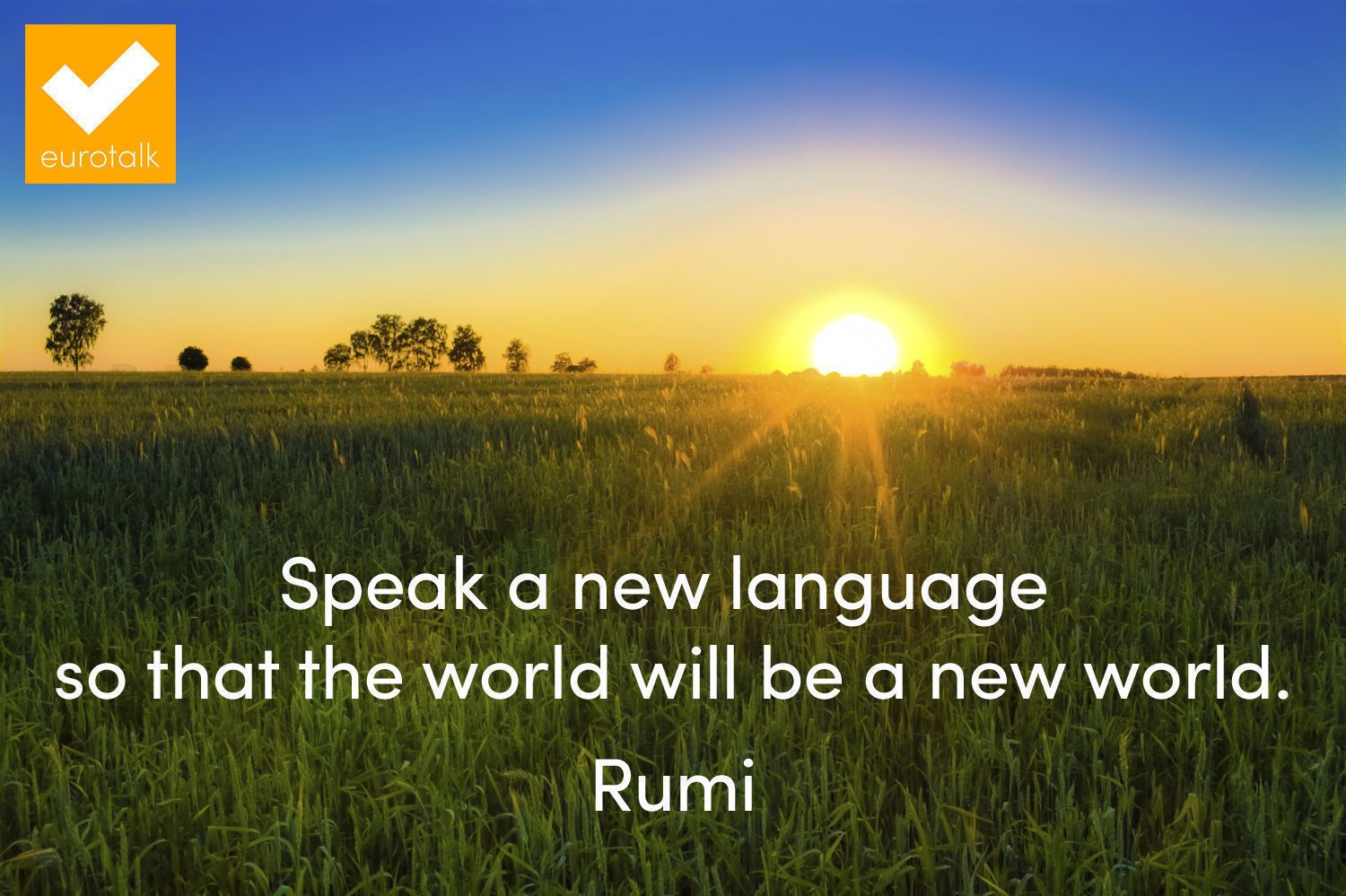Quote of the week: 5 Apr 2014
For more like this, visit us on Pinterest.
Embed This Image On Your Site (copy code below):
8 common language mistakes to avoid [infographic]
When you’re learning a new language, it’s easy to make mistakes. And that’s ok; it’s the best way to learn. But sometimes you might think you know what you’re saying, and actually you’ve said something very different. Here are a few examples to look out for…
Please let us know your own examples and as always, do feel free to share the infographic with others.
Infographic created by Adam (research) and Luke (design)
Embed This Image On Your Site (copy code below):
The oddness of English
I don’t know about you, but I think one of the challenges about language learning is knowing how to spell a word you hear spoken and knowing how to pronounce a word you see written down. Some languages are more phonetic than others, which makes things a bit easier, but then some don’t have any standardised spelling, which makes things very hard. English, luckily, has standardised spelling, but its pronunciation lacks some logic and so it can be a nightmare knowing where to stress a word – and often if you get it wrong you say something you don’t mean to!
 A few words in English have optional pronunciation, like ‘harass’, which can be either ‘harAss’ or ‘hArass’, but the majority of words have a standardised pronunciation. This can cause problems when the spelling is the same for several different words that sound different. You can’t guess these things, they just have to be learnt. ‘Bow’ is a great example: depending on how you pronounce the vowel it can either mean the bow that an archer uses or the bow of a boat. Then, to confuse matters more, a bow (lowering your head to show someone respect) has the same pronunciation as the boat bow. Some other common examples include ‘minute’, which can be either a division of time or an adjective for ‘very small’, and ‘wind’, can be a strong breeze or the action of twisting something around. People row amongst themselves and row in a boat. And, although there’s a capital to help distinguish them, lots of tourists (understandably) pronounce ‘Reading’ (the city) as they would ‘reading’ (a book).
A few words in English have optional pronunciation, like ‘harass’, which can be either ‘harAss’ or ‘hArass’, but the majority of words have a standardised pronunciation. This can cause problems when the spelling is the same for several different words that sound different. You can’t guess these things, they just have to be learnt. ‘Bow’ is a great example: depending on how you pronounce the vowel it can either mean the bow that an archer uses or the bow of a boat. Then, to confuse matters more, a bow (lowering your head to show someone respect) has the same pronunciation as the boat bow. Some other common examples include ‘minute’, which can be either a division of time or an adjective for ‘very small’, and ‘wind’, can be a strong breeze or the action of twisting something around. People row amongst themselves and row in a boat. And, although there’s a capital to help distinguish them, lots of tourists (understandably) pronounce ‘Reading’ (the city) as they would ‘reading’ (a book).
So, fine, we accept and conquer these challenges and push on with the language learning. But then there’s a new pitfall: words which sound exactly the same but have multiple spellings, each one indicating a totally different meaning. Depending on whether you learn better from listening or reading, you’ll probably be more flummoxed by one of these caprices of the English language than the other, but they’re both pretty challenging. Plenty of native English speakers, especially at the end of a long day when the concentration is waning, will find themselves putting ‘whether’ when they mean ‘weather’, ‘their’ when they mean ‘there’, ‘where’ when they mean ‘wear’. These are the ones that always spring to mind, but when you start thinking about it you’ll find a huge list of potential stumbling blocks. ‘Hey’ is a greeting’ whilst ‘hay’ is dried grass; ‘wine’ is a drink and ‘whine’ is the sound of a petulant child; ‘sails’ belong to a boat whereas ‘sales’ are discounts in the shops; you drink a ‘draught’ of something or use it to describe the depth of your boat, but a draft is a first copy of something.‘Hour’ is a division of time but ‘our’ belongs to us all. You grow ‘leeks’ and have ‘leaks’ in your roof. You ‘knead’ bread and ‘need’ air to survive. A plant has ‘roots’ but a road is a ‘route’.
I could go on, but the list is very long and I also want to mention the third group of confusing words, the ones which both look and sound exactly the same but have two completely different meanings, which have to be divined from context. So, a ‘coach’ both trains athletes and is a large vehicle. Fish have ‘scales’ and ‘scales’ are used to weigh things. A ‘stable’ houses animals and describes how sturdy something is. ‘Second’ is both a division of time and comes after first. ‘Bark’ belongs to a tree and is the sound of a dog. And ‘port’ is either a fortified wine, a harbour or the left side of a boat.
I’ve only mentioned a few of them and they’re the ones I’ve noticed causing confusion, but if you have any you’d like to add, whether in English or any other language you may know, we’d love to hear them!
Nat
Why learn Mandarin Chinese?
In Europe and the United States alike, a growing interest in Mandarin Chinese is leading to big changes in public and private education, with various schools for adults and children now incorporating this language into their curriculum. Many parents are currently encouraging their children, aged as young as four or five, to learn Mandarin, in an attempt to boost their prospects in the face of an increasingly competitive workforce.
Chinese growth
Despite a marked increase in popularity of Mandarin Chinese, it is interesting to view a spate of news articles and blogs advising adults and children alike not to bother learning this challenging language. Fluency in this language is impossible, their authors say, without spending many years in China; Mandarin (which utilises over 2,000 characters) is too difficult to learn in one’s free time; the tonality of the language (an array of pitches are used to convey different meanings) is a hurdle most students will fail to overcome. Even eight hours weekly spent on the subject, they claim, is not enough for top-grade fluency to be achieved.
Yet the statistics cannot be argued with: currently, some 40 million foreign students are studying Mandarin in China and by the year 2020, the Chinese government predicts that this number will rise to 100 million. According to Malaysia-chronicle.com, ‘China is now the number one producer of wind and solar power in the entire globe’. It is also the number one nation in the world in terms of trading when import and export totals are added; it boasts more foreign currency reserves than any other country; China consumes more energy than the U.S. and is the leading manufacturer of goods. There is no doubt that the study of the Chinese language can open many doors, many of which are simply not immediately foreseeable. Owing precisely to the difficulty of Chinese, children have a better chance at achieving a good conversational level if they start young. Moreover, bilingualism is not the only valid goal for budding students; even having an intermediate speaking level can go a long way in sectors such as the tourism industry.
Increase in Chinese tourism
Recent developments show the growth of Chinese investment in Europe. In late 2013, Chinese Premier, Li Keqiang, attended a Sino-CEE summit in Romania, where he and dignitaries from 16 other countries pledged to forge tighter economic ties in the near future. Chinese tourism to Europe is also on the rise, with countries like Spain receiving some 33 per cent more visitors in 2013 than in 2012. Many Chinese tourists favour countries like Spain and Italy as popular tourist destinations. As noted by planetcruise.co.uk, the Mediterranean is one of the ‘most popular cruising destinations’ for tourists from across the globe. In addition to economic reasons, there are more factors attracting children and adults alike to hone their skills in Mandarin. Recent studies indicate that speaking this language has an entirely different effect on the brain than speaking other languages. The study, undertaken by researchers at the Wellcome Trust in the UK, has revealed that the tones, sound and complicated characters used in Mandarin Chinese employ both temporal lobes in the brain (speakers use only the left temporal lobe for the English language). As Languageboat.com states, ‘learning Chinese may train a host of cognitive abilities not utilised in the study of other languages’.
It is hardly a source of surprise to find that learning Mandarin has such vastly different effects on the brain than other languages, all of which descend from a system developed in Mesopotamia thousands of years ago. The origins of the Chinese language are of a completely different nature and although learning this language for the first time can undoubtedly be time-consuming and challenging, it is also an entertaining and, some would say, beautiful, melodic way to boost one’s economic future and brain power.
Eve Pearce
Quote of the week: 22 Feb 2014
For more like this, visit us on Pinterest.
Embed This Image On Your Site (copy code below):




